When should kids start cooking? (Q&A)
Kids in the kitchen has long been a passion of mine and continues to be a subject I will enthusiastically take up with parents anytime, anywhere.
The number one question I am asked is the topic of today’s Q&A discussion: When should kids start cooking?
For me the answer is a simple one: immediately. At least, bring them in the kitchen with you as soon as possible.
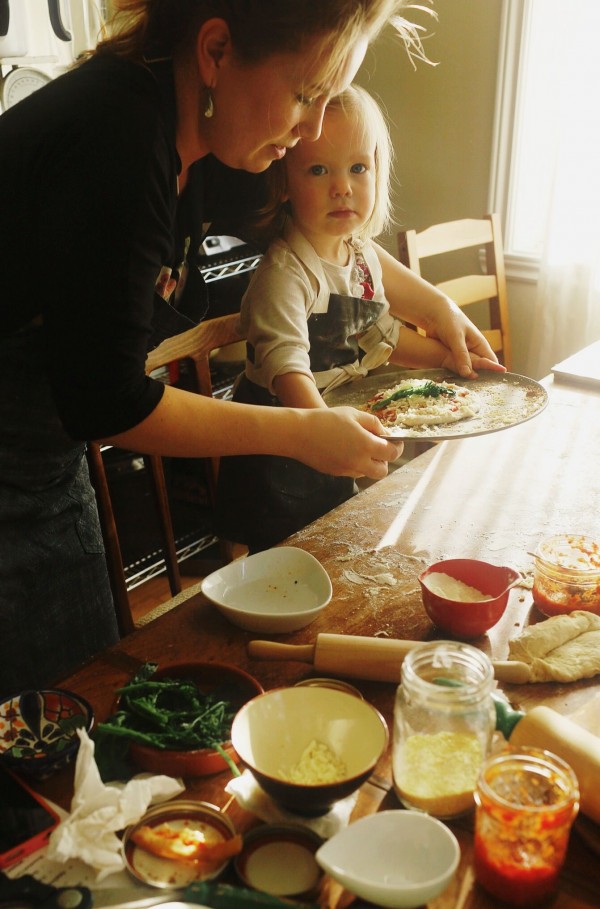
Children can benefit from joining you in the kitchen from infancy. Keep them near, in a highchair, swing or sling. Let them watch you move about and talk to them about what you are doing. Give them utensils, measuring cups and ingredients to play with as they begin to develop motor skills. When they have started solids, have them taste test alongside you.
Let them feel the pulse of the home at this central spot from an early age, and when it comes time to get cooking – really cooking, with knives, ingredients and heat – they will have already picked up a wealth of knowledge intuitively. At 20 months, Clara is demonstrating this to be true, and surprising me with her adeptness at such an early age.
I recently read an article “10 things children should learn to cook” on The Guardian’s Word of Mouth blog and agree wholeheartedly. Here’s a fantastic quote from the article’s author, Claire Thomson:
“Letting your kids loose in the kitchen is affording them a sense of autonomy that will set them in very good stead. Sure, ovens are hot and knives are sharp, but with a bit of guidance in these early years, they’ll soon have the confidence to cook unaided in the kitchen.”
Read the rest of the article over on The Guardian.
Want to get into the kitchen today with your little ones? Start with my post Easy Recipes that Kids Can Cook for a round-up of our favorite recipes.
Please chime in with your thoughts on starting children on their own journey in the kitchen! Any tips?

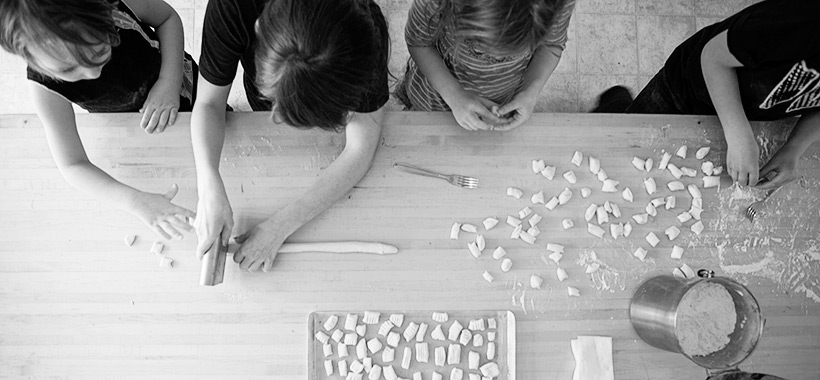
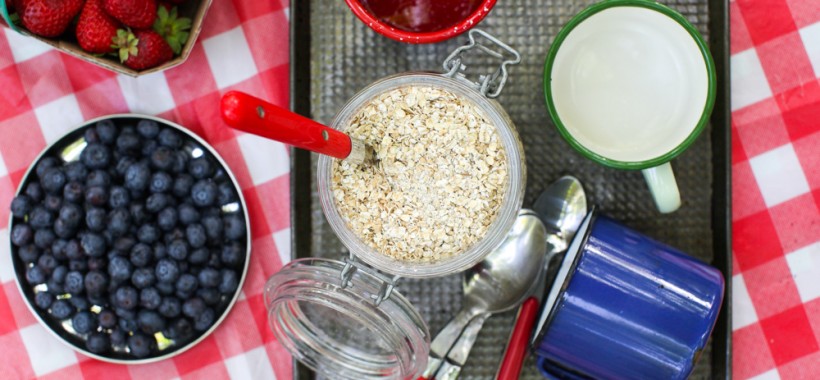
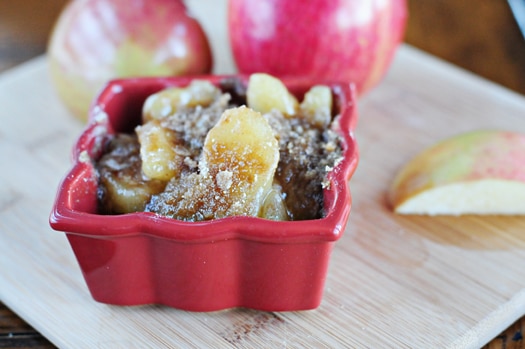
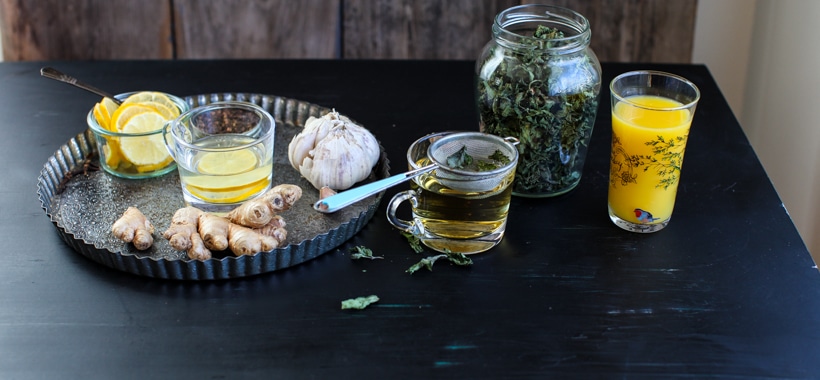
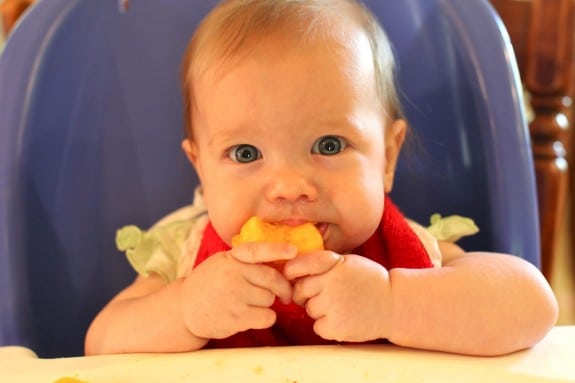
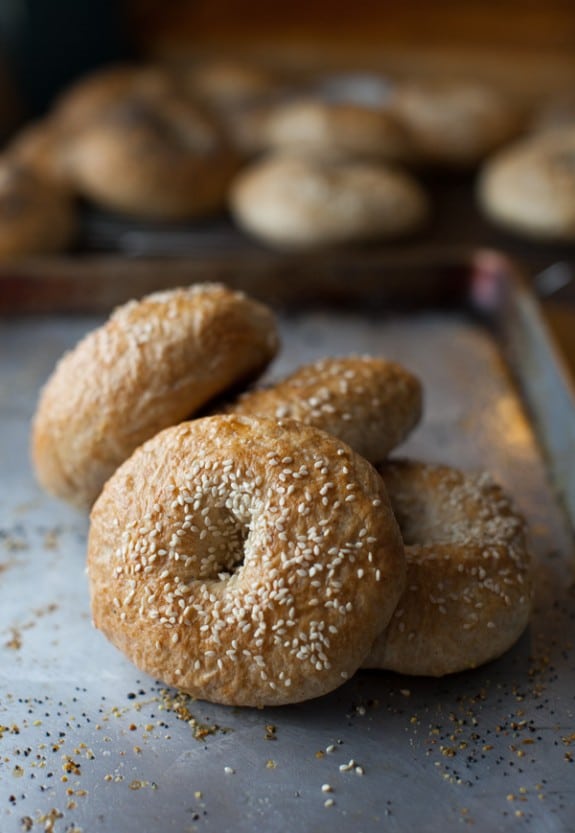
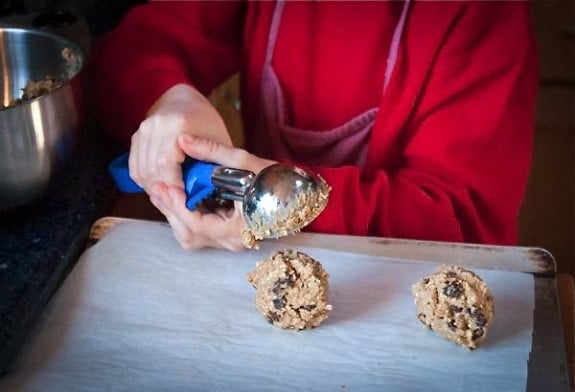
Well Aimée you know my thoughts on the matter 😉 I think it’s a great idea to get them in the kitchen as soon as you can – that intuitive knowledge they pick up at such an early age is so so valuable. With the boys in my clubs, it’s easy to tell who has played in the kitchen as a child and who hasn’t – and of course, it’s wonderful to introduce those who haven’t to the joys of cooking and baking. Kids in the kitchen can be a magical thing (along with a little of the chaos you have to expect!) and my two afternoons with the boys in our science lab come kitchen are some of my favourite moments of every week!
Mardi, you are an inspiration. Thanks for sharing and keep it UP!
I always put a damp cloth under the kids’ mixing bowl – it keeps it from shifting around and cuts the spills way down! So much important learning (and bonding) happens in the kitchen – really worth the investment in time.
That is a great tip, Robin. Sounds like you have plenty of experience cooking with kids. 🙂
Aimee, so nice to read this.
I can not agree more.
My son is 9 years old and can now cook complete meals. I’ve been exposing him to cooking since his very early days; like all little kids, he loved so much to touch, taste, smell…
I think, it’s very educational and it opens new worlds to kids.
When travelling other countries, he is the first to ask to try out new things in local backeries and food shops. Experiencing a country through food is quite an adventure:-) and it’s so rewarding.
Have a great weekend!!
What an encouraging report! I remember cooking full family meals at 9 also. Great memories.
Well said! The BEST thing in my house is our learning tower (http://koskersidlewild.blogspot.com/2011/08/pinterest-challenge.html) which allows my girls to be at the right height to help me in the kitchen! Plus, now that I cook with Thrive foods, all of the chopping is done so my girls simply measure and pour and at 2 & 4, are able to do most of the steps needed for a healthy, delicious dinner!
We haven’t invested in the learning tower and have made do with a chair. Nice to hear it’s been such a handy tool. Keep it up!
I always love cooking with my daughter, it’s our special time when the younger boys are asleep at the same time. I do find it slightly more stressful when I’m cooking with both a 4 and 2 year old. Including them is important to me, yet it’s hard when there isn’t a lot of counter space. I have found it’s easier when I plan ahead who will do which tasks (break eggs, stir dry ingredients, stir wet ingredients, etc.)
My handy clean up tip is to put half sheets under bowls or measuring cups to help minimize the spillage onto the floors. I love seeing the picture of Clara at the table…I never thought to use that for our prep work. It would help with the issue of counter space.
Two is a tricky age and I find it best one-on-one. Clara won’t be two until March, but she does really well by my side.
Yes, we often set up our family pizza night around the table- there’s more space and all the toppings are within reach in the centre of the table.
My goddaughter is now 9yrs old and she cooks with me and her mom often. From the time she was able to walk she would stand at the kitchen counter, with her own kitchen toys, and pretend she was cooking with me. By the time she was tall enough to see over a pan on the stove she helped me make pancakes & scrambled eggs for breakfast. She then showed her Mom & Dad her skills and started cooking at home.
It makes me happy to see that I’ve passed on the joy of cooking to the next generation.
That is pretty cute! We have a toy kitchen that gets a lot of use. It’s a fun gateway into real cooking.
I love having my kids in the kitchen with me, and personally think that it’s never too early to let them help! 🙂
Yay! I bet they love to help you, Sommer.
Yes! I had some people over the other day who were amazed that my kids were eating a soup with chard in it. But they helped make it, they helped chop the chard, the helped stir the pot, and they helped flavor check while it cooked. Cooking really changes kids perception of the food, I think.
For me, the hardest part has just been letting go of a little control – sometimes I have to pick out egg shells when they crack the eggs, sometimes I hover nervously while Esme chops an onion, but so far, things have always worked out! You are such an inspiration, as is Simple Bites – thank you!
I’m frequently inspire by your journey, balancing children and cooking, Allison, so thanks for your words.
Oh my gosh!! Clara is seriously the cutest thing ever. And I agree – get kids in the kitchen. It helps them develop in so many ways.
Thanks, Rachel. 😉 She suits the flour-dusted apron.
I agree! Inviting children into the kitchen from the get go is important to helping them create a connection with real food. I learned to cook at my mother’s knee and my children are doing the same. This is how making food from scratch becomes second nature and how children develop curiosity and confidence in the kitchen. I engage my children’s friends in the process too, whenever the opportunity arises. (Punching down homemade pizza dough holds particular fascination for kids from non-cooking households.) I could go on and on but suffice to say, it is a joy for me to watch my kids (now age 10 & 13) create in the kitchen with confidence and abandon. And they’re responsible for washing up too.
That’s super cool, Bridget. I’ll have ages 10 and 13 in another five years. There’s lots of learning to happen between now and then!
I think they should start as soon as possible. In my experience, kids of any age build confidence by learning to do something that can spark creativity and also things that not anyone can do without practice. Having one or even two signature things they like to make gives them a sense of pride for their hard work. This particularly helps during those difficult teen years too.
I also think that it can give them a healthy sense of food and eating. Quality versus quantity and an appreciation for what it takes to make good food.
Thank you for sharing this with us!
Wise words, Dionne! Thank you for sharing.
I consistently encourage my five year old to assist me in the kitchen. He usually does and loves it. I’ve noticed he is more willing when creaming butter & sugar is involved, 🙂 and less interested when there is a chance to wrestle w/ Daddy. Boys will be boys!
Yep, that’s an age when baking is more popular than cooking. 😉
My oldest is 6, he has been helping in the kitchen since he could hold a mixing spoon.
Last week he woke us up at 7am, because he had fried bacon for breakfast, and wanted some help with eggs to go with it.
Yes, I was a little scared – but he has been taught about the oven, to wash his hands after handling raw food, how to place his chair so he can be close but not too close to the stove, and guess what? He did great!
(We have since made a rule that an adult must be with him when he cooks, but that if we are in the kitchen, he can do it all by himself if he wants.)
He is so keen on cooking – he likes to make salads to go with dinner, he loves to chop vegetables for me to cook with, and loves to make smoothies.
One of the best things about involving kids in all of the cooking, is it that instead of simply learning how to bake, they gain a love of eating real food.
Impressive, Beth! That is a fantastic start. And yes to the interest in real food and scratch cooking.
ASAP, I could not agree more. That’s definitely how I developed my love for food and cooking. From an early age I did lots of baking with my grandma and my parents always made dining an experience. We would go out to nice restaurants just for the experience. Even our travel centred a lot around food. It’s definitely something I’ve been very fortunate to have been exposed to.
Sounds like a fun start, Mallory. We certainly hope to travel more with our children when they are a little older.
I’m in the “as soon as possible” camp. I remember being in early grade school and trading bragging rights over who knew how to cook the most things. My girls have been in the kitchen with me from day 1. My oldest, almost 5, likes to count what she “knows” how to cook so she can be “grown up”. Lol. It’s good for math and reasoning skills along with food and diet knowledge.
My husband and I both cook with slightly different styles which I think helps them to be a bit more well rounded. There is never only one way to do things.
I love that your children cook with your husband too. That is a really good point.
My kids have been helping in the kitchen, since they were old enough to push a kitchen chair across the kitchen to watch what I was doing! They are both excellent cooks now!
I’m not surprised, Dawn! Keep it up.
I started baking withr Timothy. I did it cooking show style by pre-measuring and letting him put everything in to the mixing bowl. Now that he is a little older we let him use a small knife while we help hold it. It is very empowering for him.
Sounds like a good way to start, Christina. We definitely had a few ‘whoops’ moments with salt, baking soda, etc. 😉
Being in the kitchen is one of my favorite pastimes and I (usually) love it when my boys join me. I have two boys, 3.5 and almost 2. One of my favorite things is to hear how excited they are to participate in whatever I\’m doing. My older son is really starting to show progress and the ability to help. He is adept at cracking eggs now and is able to help with lots of other small tasks. I\’ve even started letting him use the stove (under constant supervision) to do simple things like brown butter or scramble eggs. One thing I have found helpful for when they want to be with me in the kitchen but can\’t really help in what I\’m doing is to let them \”work\” at the island with plain flour or a simple flour/water dough. They get to use all the fun kitchen tools and be a part of what is going on, while I can focus on what I need to do. I think that one of the best parts of their constant participation is their awareness of where food comes from, that it takes work to have healthy things to eat, and a generally large food vocabulary. It\’s always so fun to hear my older son \”cooking\” with play-doh, talking about making risotto, Brussels sprouts, grinding spices, etc. I look forward to many more years of being together in the kitchen! Thank you Aimee for being a constant inspiration too and for sharing so many great recipes to try in our home 🙂
I love reading everyone’s comments on this!! My kids are still very young, so it’s inspiring to hear so many enthusiastic reports of those who are reaping the rewards of quality time, teaching and developing shared interests between parents and children!
In addition to inspiring my children to enjoy preparing food and serving it to others, for me, being in the kitchen together is the opportunity to discover just how beautifully and healthfully God designed so many real, whole foods. I’m able to combine my formal nutrition education with my love for our Creator in an atmosphere where they can tangibly see, touch and taste that He is indeed good!
Great article Aimee and fantastic to give others encouragement to start cooking with their kids as early as they can. I’m a big believer in letting the kids get stuck in and in fact I set up and run a kids’ cooking school in the UK (The Kids’ Kitchen) for this reason, teaching kids from 2 years old.
Starting kids cooking at a young age is a great way of teaching them about healthy eating and helping them broaden their palate before they become fussy eaters. I believe that if kids enjoy their time in the kitchen it will lay the foundation for a love of cooking and a curiosity about food and where it comes from. And this is of great benefit for them as individuals as well as for the wider family – parents often tell me their kids request recipes that we’ve made in class or tell them “that’s not how we do it at The Kids’ Kitchen!” So teaching your kids to cook can be as much of a learning experience for parents as well as the children.
In my experience, kids are always really positive and keen to get stuck in. Whether they are chopping, stirring, or grating, it never ceases to amaze me how much even little children can do when you give them the chance. They are very independent and you can really see their satisfaction as they proudly present what they’ve made for the family to try. And it’s an amazing feeling to see kids try an ingredient that they didn’t think they’d like and that they don’t normally eat! So be brave, be calm about the (inevitable) mess, and get stuck in 🙂
Some of my top tips are: pre-measure ingredients for pre-schoolers (makes the cooking time quicker, less stressful and allows them to be more hands-on); melt butter when baking (much easier for the kids to stir by hand and makes little taste difference); play “games” with food and give certificates for trying new foods (eg try eating dried apples off string, bite carrots into funny shapes, try picking up raisins and berries with a toothpick – good for motor skills too); make up silly names for food (one of my most popular smoothies is known as “slime” because it has spinach in it, but all the kids love it and request it often at classes). And do come by and check out some recipes and photos of the things we make to give you inspiration on our website and Facebook page https://www.facebook.com/TheKidsKitchen
I really love this post, Aimee. This is a question I often find asking myself because when I have kids, I want them to be in the kitchen with me as early as possible. When they should start cooking? As soon as they can with careful supervision! I want them to love food and love the kitchen as much as I do 🙂
What a great post! I started taking my daughter (now 5) in the kitchen really early, mostly because she insisted to do what I do. Now she is slowly taking over the kitchen, remembers all the recipes we do more often, knows where everything is placed and develops her own recipes which she makes her older brother to write down.
I’m a little bit sad I didn’t incorporate my oldest in the kitchen, because I can see the difference now. But it’s never too late to teach the basics so he can enjoy cooking as much as the rest of the family!
Letting go of control was the worst for me, too, especially with the knives. She has her “own” kitchen knife now so she knows which one is ok to use. The oven is off limits, though, I don’t know when I will allow her to use that (under supervision) but I think she has to grow until she doesn’t need a chair to reach the oven top. When would you let your children use the oven?
Very topical in my life, I could use some advice. My almost 5yo has been asking to learn knife skills. She doesn’t have the hand eye coordination or small muscle development, but I dont want to squash her passion. So far we let het use the big knife to squash garlic. Any ideas?
Mirinda, some suggestions I hope might be useful. I start the kids with plastic kids’ knives (the Ikea ones) until they learn how to use them properly ie how to hold and pass them safely, not to eat off their knife etc. Then I progressed to the tomato knife with my kids (Google it – hard to describe!) which I like as it’s a “proper” knife and good to chop with, but with a rounded blade which is safer. [As an aside, you can get special kids’ knives from Pampered Chef I think, but I don’t like these as you need to have a sawing action to cut things which I don’t think sets up good habits for later]. And I love using the mezzaluna with kids as with both their hands on the handles, they are away from the blade and you know they are safe. Hope that helps 🙂
I don’t remember when my kiddo started getting more involved in the kitchen, but it was definitely a natural progression, not really a “lesson” in cooking. I probably started off with something either fun (like baking) or maybe even necessary, like having to cook and keep him nearby.
It’s definitely more feasible when he reached toddler-age, because he could help “pour” things. For instance, i would measure things out in cups and spoons and it was his job to pour it in. Or sometimes he’d just watch and I’d hand him ingredients that he could touch and taste, like extra basil leaves he’d play with or a diced tomato.
Hey, this is a great idea !!! I think this is best tips I’ve found online.
Thanks for sharing.